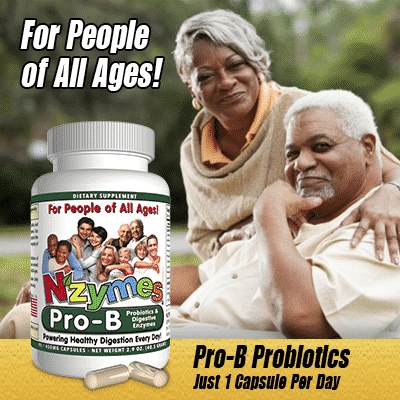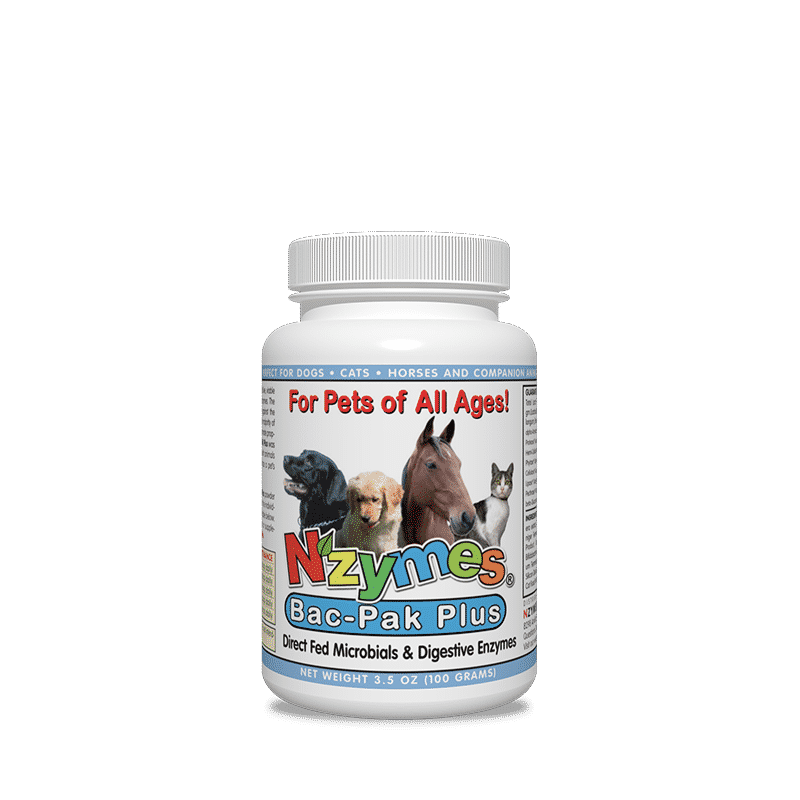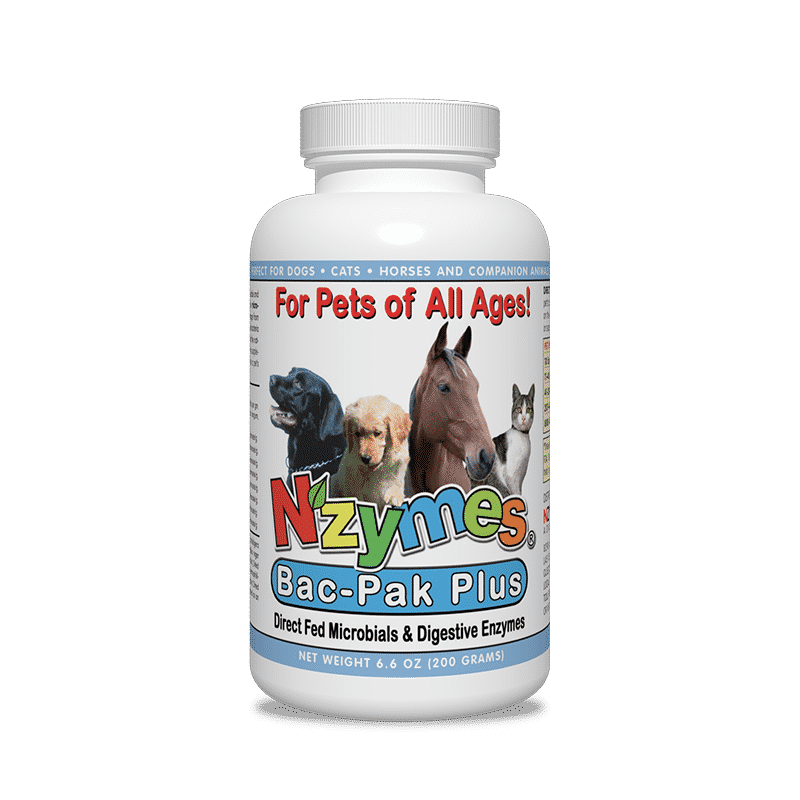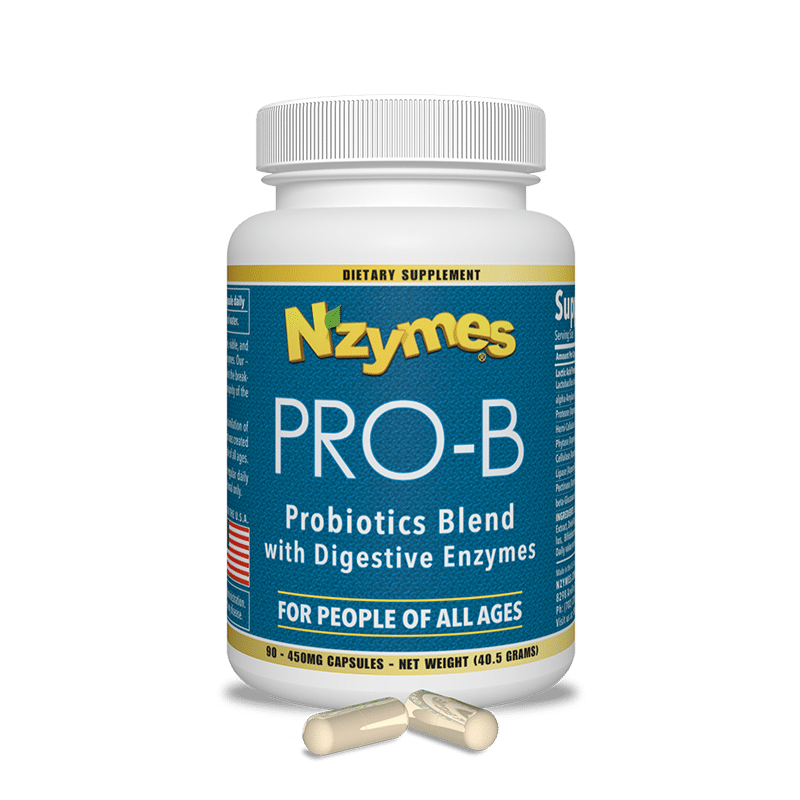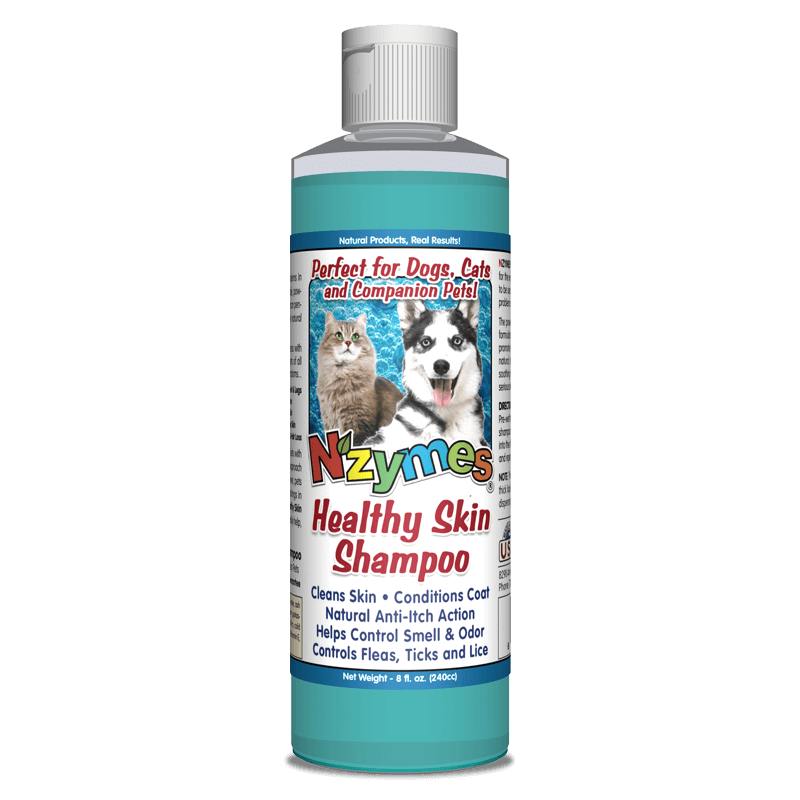
Natural Digestive Solutions
Bac-Pak Plus & Pro-B Probiotics
Every BODY Need Enzymes!
Natural Digestive Solutions for Today’s World!
We’ve all heard the saying, “Death begins in the colon.” Many alternative medical practitioners believe that a disruptive ecology of the GI tract may cause up to ninety percent of all known illnesses and diseases in people and pets. Humans and animals get sick when their Gut becomes disrupted and damaged. The natural digestive solutions provided by Beneficial (friendly) microorganisms can no longer flourish in needed numbers to maintain the proper shielding balance. This imbalance requires nutritional digestive support to begin to rebuild the bacteria foundation and a healthier immune system.
Common Causes of Gastrointestinal Disruption
Antibiotics
Antibiotics have been a lifesaver for millions of people since the late 1940s. However, today it is well known that the primary cause of GI disruption for both people and pets is the previous use of antibiotics.
The issue is simple, antibiotics don’t just kill the BAD bacteria, they kill the good as well. This is the key factor involved in the breakdown of the body’s natural flora.
Food and Water – Part of Our Daily Lives
Maybe you are not personally taking antibiotics or giving them your pet. Unless you take constant precautions with food and water then it’s likely to still be consuming antibiotics regularly. When your pets drink chlorinated water, or eat antibiotic-laden foods, or take prescription antibiotics to fight and infection, significant portions of the body’s key beneficial bacteria often become depleted as well as the destruction of bad bacteria.
Sugar is Not Always Sweet
A significant source of GI disruption comes from the consumption of too much sugar! Let’s face it, folks, sugar is out of control in our country. Sugar contributes to the formation of harmful biochemical compounds that spike inflammation. Sugar and refined carbohydrates cause unhealthful, inflammation-boosting changes to gut bacteria—now recognized as a key regulator of overall health.
What Sugar in My Pets Food
One of our biggest concerns today is the amount of sugar in pet foods and treats. Believe it or not, the general pet food products being sold through supermarkets, pet chains, warehouse stores, and even your Veterinarian, are laden with sugar! A recent study found pet foods sold at these locations can range from 43 to 53% sugar for the entire bag. Please Note: You don’t see sugar listed as an ingredient. So know your ingredients.
That is why you must know about Probiotics (direct-fed microbials) and Digestive Enzymes – the Natural Digestive Solutions for the times we are living in today.
Nzymes® BacPak Plus for Pets and Pro-B for People are blends of live, viable, and naturally occurring micro-organisms (Probiotics) and Digestive Enzymes. These unique, micro-encapsulated formulas help to promote proper digestion and natural assimilation of nutrients from foods to optimize the health of the digestive tract and immune system. For Pets & People of all ages.
The special Micro-Encapsulation process used provides key protection against the breakdown of the Probiotic cultures by heat and stomach acids and ensures that 95% of the viable bacteria reach the GI tract.
Probiotics and Digestive Enzymes
Probiotics
How Do Probiotics Work?
Probiotics work by attaching themselves to the intestinal wall. These friendly bacteria keep pathogenic bacteria from gaining a foothold. In addition, they produce lactic acid and hydrogen peroxide, (which kill most disease-causing bacteria). Some yogurt and other fermented food have these cultures, but may not be strong enough for the problems being caused in today’s environment. This is why daily supplementation with Probiotics is so important. Yet it costs only a few pennies a day to supplement yourself and your pets
What Are The Benefits?
In large enough numbers, these friendly bacteria keep disease-causing bacteria from overpopulating the intestine. Also, they improve digestion, manufacture B vitamins, and boost immune system activity. Because they boost immunity, they positively influence the overall health of the individual.
Understanding Probiotics
Probiotics help supplement the production of Lactic Acid-producing bacteria in the digestive tract which helps in balancing the pH and colonization of beneficial bacteria in the lower intestinal tract. This creates a hostile environment for undesirable bacteria to colonize and enhances the growth of several digestive enzymes found in various stages in the digestive system. The synergistic effect aids in maintaining more normal intestinal functions.
Probiotic Cultures
Lactobacillus Acidophilus – Microencapsulated species-specific, to stimulate natural lactic acid production, creating a sudden downshift in the pH in the small intestine. Increasing levels of lactic acid allow for greater fluid and nutrient transfer across the intestinal wall. Lactobacillus acidophilus is the most commonly used probiotic, or “friendly” bacteria. Such healthy bacteria inhabit the intestines and vagina and protect against the introduction and proliferation of “bad” organisms that can cause disease. The breakdown of food by L. acidophilus leads to the production of lactic acid, hydrogen peroxide, and other by-products that make the environment hostile for undesired organisms. L. acidophilus also produces lactase, the enzyme that breaks down milk sugar (lactose) into simple sugars. People who are lactose intolerant do not produce this enzyme. For this reason, L. acidophilus supplements may be beneficial.
Bifidobacterium Thermophilum – Microencapsulated species-specific, designed to be viable (live) until It reaches the small intestine, aids in stimulating the lactic acid production. A very beneficial colonizer in the intestinal tract that replaces the space vacated by the undesirable bacteria after a downshift In the pH. This particular strain is very quick to colonize (multiply) in the intestinal tract.
Bifidobacterium longum – Microencapsulated for storage and viability until it reaches the lower gut (small intestine). This provides a very quick response time at colonizing (attaching to the lining of the intestinal tract) therefore leaving less space for undesirable bacteria to attach. It also helps to maintain a higher percentage of fluid and nutrient assimilation through the intestinal wall.
Enterococcus faeclum– Microencapsulated, durable strain of bacteria that is a great stimulator of lactic acid production in the intestinal tract of the individual. This particular strain is very beneficial in the synthesizing of B vitamins.
Bacillus Subtilis – A very durable strain of bacteria. It enhances lactic acid production. This particular strain demonstrates properties that have been shown to reduce nitrates and stimulate the production of additional enzymes (amylase, protease, and lipase).
Digestive Enzymes
How Do Digestive Enzymes Work?
Specific digestive enzymes have been selected to break down the major substrates of nutrients that are being consumed by the individual thus enhancing the overall nutrient assimilation of the food that is being consumed. This relates to more bio-available nutrients being used for the health of the Individual and less being passed away in the stools.
Digestive Enzyme Species
Amylase – Increases the utilization of starches that are being consumed by reducing the molecules to smaller molecular weights, which can be more readily absorbed into the blood system.
Protease – or proteolytic enzymes enhances the utilization of the proteins that are being consumed, reducing them to usable peptides and amino acids which make this substance more bio-available to the individual. Protease helps to clean up your body by removing the unwanted protein from your circulatory system and bloodstream and helps restore your energy and balance.
Hemi-cellulase – Readily digestible cellulose is held in bundles by Hemi-cellulose fractions. Hemi-cellulase specifically aims at and breakdown these Hemi-cellulose fractions opening up the cellulose to make it more available for digestion.
Phytase – Hydrolyzes phytic acid which is widespread and the principal form of phosphorus in many seeds (phytic acid contents are about 60-80% of the total phosphorus in seeds), Phytic acid binds minerals such as iron, zinc, calcium, and magnesium, therefore it reduces their bioavailability.
Cellulase – enhances the utilization of the fibrous portions of the food that is being consumed.
Lipase – helps to supplement the inherent enzyme system in the breakdown of fats and lipids. Also increases the bioavailability of fat-soluble vitamins.
Pectinase – Reduces the structure size of the plant pectin into galacturonic acid to maintain water balance to avoid excessive fluid passage, which is essential for cell growth and development.
Beta-glucanase – Specific enzyme to hydrolyze and enhance the bio-availability of specific types of starch molecules.
Fiber
Yucca Schidigera Powder
Yucca Schidigera – is a natural plant fiber that has ammonia binding capabilities. This helps stimulate blood flow by reducing blood cholesterol and abnormal blood triglycerides. It also helps to reduce the inflammation in joints, which include chronic arthritis and decreases the number of toxins available for absorption from the digestive system. The body’s elimination system (kidneys, liver, lymph, and blood) is thus less taxed to remove poisons from the body. This lowers the build-up of toxins in the joints and elsewhere which seem to be related to diseases like arthritis.
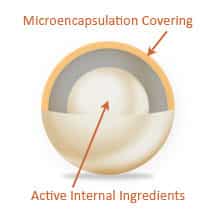 Micro-Encapsulation
Micro-Encapsulation
Protected By Micro-Encapsulation
The special Micro-Encapsulation process provides key protection against the breakdown from external heat and stomach acid and ensures that 95% of the viable bacteria penetrate to the GI tract.


